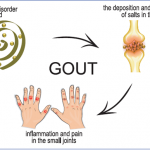 The U.S. Food and Drug Administration (FDA) is currently considering an application for a subcutaneous formulation of rituximab. The agency has also approved a supplemental application for etanercept to treat pediatric patients with plaque psoriasis. Additionally, a new guideline for treating gout has been published by the American College of Physicians.
The U.S. Food and Drug Administration (FDA) is currently considering an application for a subcutaneous formulation of rituximab. The agency has also approved a supplemental application for etanercept to treat pediatric patients with plaque psoriasis. Additionally, a new guideline for treating gout has been published by the American College of Physicians.
FDA Accepts Application for Subcutaneous Rituximab
The FDA has accepted the biologics license application (BLA) for the subcutaneous formulation of rituximab (Rituxan), with an action date of June 26, 2017.1 The BLA was accepted subsequent to updated study results from the Phase 3 SABRINA trial, which compared subcutaneous and intravenous rituximab in previously untreated follicular lymphoma oncology patients. Data from this study will be presented at the American Society of Hematology Annual Meeting, Dec. 3–6, in San Diego.
Etanercept Approved for Pediatric Plaque Psoriasis
The FDA has approved the supplemental BLA for etanercept (Enbrel) to treat pediatric patients (ages 4–17) with chronic moderate to severe plaque psoriasis.2 This agent is the first systemic treatment for patients at this age and with this condition. The approval was based on results from a one-year, Phase 3 study along with a five-year, open-label extension study, which evaluated the efficacy and safety of etanercept in patients aged 4–17 with chronic moderate to severe plaque psoriasis.
Adverse events seen in these pediatric patients were similar to those seen in prior studies in adults with moderate to severe plaque psoriasis.
New Gout Guideline from American College of Physicians
The American College of Physicians (ACP) has developed a guideline for managing acute and recurrent gout.3 Recommendations include:
- Clinicians should choose corticosteroids, non-steroidal anti-inflammatory drugs or colchicine to treat patients with acute gout (due to a strong recommendation with high-quality evidence);
- When using colchicine, clinicians should use low-dose colchicine to treat acute gout (due to a strong recommendation with moderate-quality evidence);
- The ACP recommends against initiating long-term, urate-lowering therapy in most patients following an initial gout attack or in patients with infrequent attacks (due to a strong recommendation, with moderate-quality evidence); and
- The ACP recommends clinicians discuss cost, benefits, harms and individual patient preferences prior to initiating urate-lowering therapy, including concomitant prophylaxis in patients with recurrent gout attacks (due to a strong recommendation, with moderate-quality evidence).
Editor’s note: The American College of Rheumatology (ACR) also has guidelines for gout treatment, which conflict with some of the new ACP recommendations. The ACP guideline recommends against using serum urate as a treat-to-target treatment strategy, whereas that is recommended in the ACR guidelines. For more information, view the ACR guidelines.



